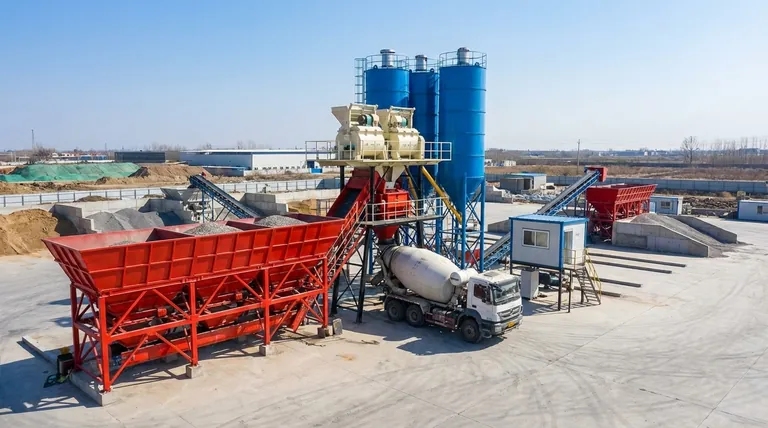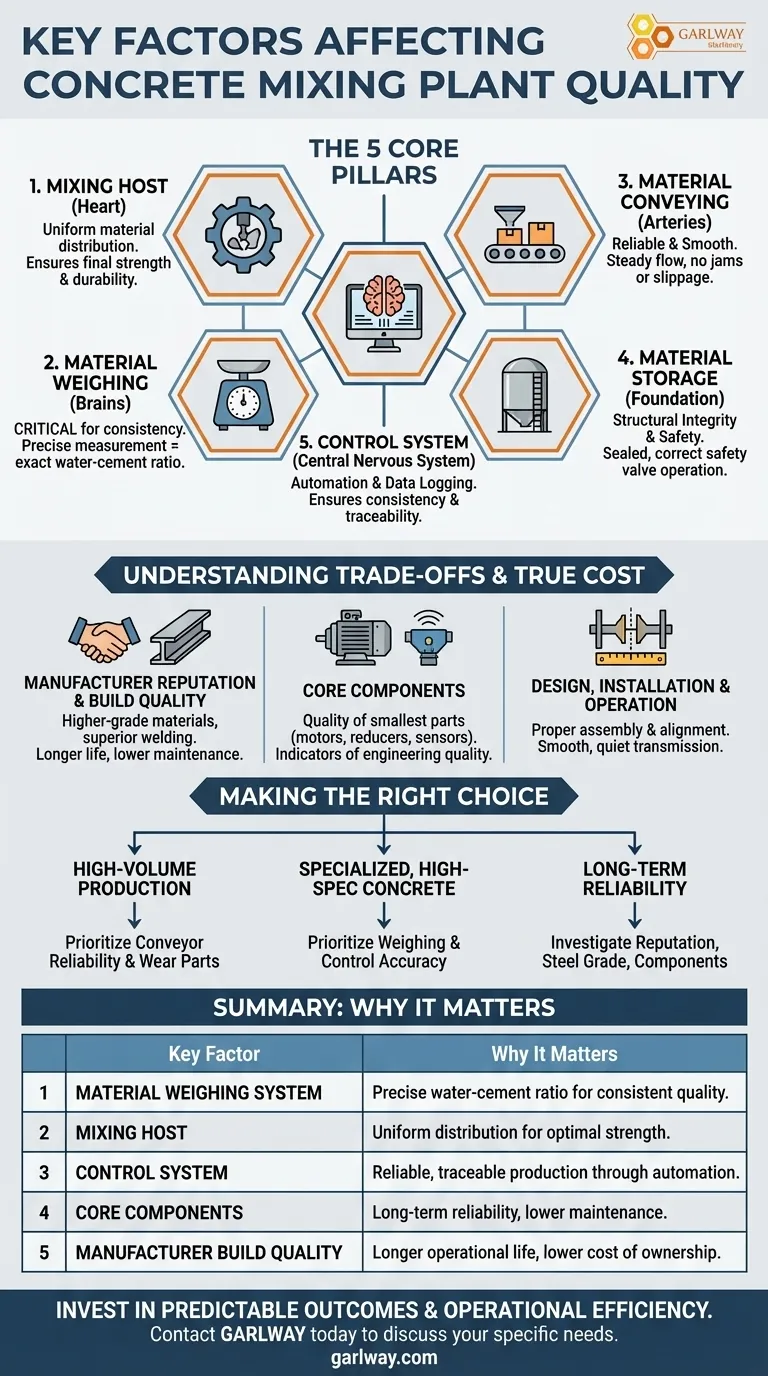The quality of a concrete mixing plant is determined by the design, manufacturing, and integration of its five core systems: mixing, weighing, conveying, storage, and control. High-quality plants excel in the precision of their measurement systems, the durability of their materials and components, and the seamless, reliable operation of the entire transmission and control network.
The ultimate measure of a concrete plant's quality is not its theoretical output, but its ability to consistently and accurately produce the specified concrete mix, batch after batch, with minimal downtime and operational friction.

The Five Pillars of a High-Quality Plant
A concrete mixing plant is a complex system where each part's performance affects the whole. Understanding the five primary subsystems is essential to evaluating its overall quality.
1. The Mixing Host: The Heart of the Operation
The mixer itself is the most visible component, responsible for combining aggregates, cement, and water.
Its quality is defined by its ability to achieve a uniform distribution of all materials efficiently, ensuring the final concrete's strength and durability.
2. The Material Weighing System: The Brains of Consistency
This is arguably the most critical system for concrete quality. Precision here is non-negotiable.
A superior plant features a highly sensitive and accurate measurement system for aggregates, cement, water, and admixtures. This precision allows for exact control over factors like the water-to-cement ratio, which directly dictates the concrete's final strength and workability.
Look for measurement hoppers that ensure smooth material flow without accumulation or overflow, as this can skew batch weights.
3. The Material Conveying System: The Arteries of Production
This system moves materials from storage to the mixer. Its quality is judged by its reliability and smoothness.
High-quality belt conveyors, bucket elevators, and screw conveyors operate without abnormal noises, slippage, or chain jams. This ensures a steady, uninterrupted flow of materials, which is crucial for maintaining production efficiency.
4. The Material Storage System: The Foundation of Readiness
This includes the aggregate bins and cement silos that hold the raw materials.
Quality in this area relates to structural integrity and safety. For example, a well-built cement silo will be properly sealed, and its safety valve will operate correctly without air leakage, preventing both material waste and potential hazards.
5. The Control System: The Central Nervous System
The control system automates, monitors, and records the entire production process.
A modern, high-quality control system provides a user-friendly interface, precise automation, and robust data logging. This ensures not only consistency but also traceability for quality assurance purposes.
Understanding the Trade-offs and True Cost
Looking beyond the five main systems reveals deeper factors that separate exceptional plants from merely adequate ones.
Manufacturer Reputation and Build Quality
The credibility and production standards of the manufacturer are paramount.
Reputable manufacturers use higher-grade steel, superior welding techniques, and more durable components. This initial investment translates directly into a longer operational life and lower maintenance costs.
The Impact of Core Components
The quality of a plant is often determined by the quality of its smallest parts.
Pay close attention to the brands and specifications of key components like gear reducers, motors, and sensors. The temperature and performance of a reducer, for instance, are clear indicators of its engineering quality and suitability for the workload.
Design, Installation, and Operation
A well-designed plant is only as good as its installation.
Proper assembly and alignment are critical. For example, specifications like the radial runout of a mixer's discharge ring (which should not exceed 1% of the inlet diameter) are signs of precise manufacturing and installation. A smooth, quiet transmission system is a hallmark of a well-built and correctly installed machine.
Making the Right Choice for Your Operation
Choosing a plant requires aligning its capabilities with your primary business goals.
- If your primary focus is high-volume, consistent production: Prioritize the reliability of the conveying system and the durability of the mixing host's wear parts.
- If your primary focus is precision for specialized, high-spec concrete: The accuracy and responsiveness of the weighing and control systems are non-negotiable.
- If your primary focus is long-term reliability and low operational cost: Investigate the manufacturer's reputation, the grade of steel used, and the quality of underlying components like motors and reducers.
Ultimately, a high-quality plant is an investment in predictable outcomes, operational efficiency, and the structural integrity of every project it supplies.
Summary Table:
| Key Factor | Why It Matters |
|---|---|
| Material Weighing System | Ensures precise water-to-cement ratios for consistent concrete strength and durability. |
| Mixing Host | Achieves uniform distribution of materials for optimal final product quality. |
| Control System | Provides automation, monitoring, and data logging for reliable, traceable production. |
| Core Components (Motors, Reducers) | High-quality parts from reputable brands ensure long-term reliability and lower maintenance. |
| Manufacturer Build Quality | Superior steel and welding techniques translate to a longer operational life and lower cost of ownership. |
Invest in predictable outcomes and operational efficiency for your construction projects. GARLWAY specializes in engineering high-performance concrete batching plants, winches, and mixers for contractors and construction companies globally. Our plants are built with precision weighing systems, durable components, and intelligent controls to ensure your concrete quality is consistently high, batch after batch.
Contact GARLWAY today to discuss your specific production needs and receive a customized solution.
Visual Guide

Related Products
- HZS35 Small Cement Concrete Mixing Batch Plant
- Construction Products Concrete Plant Machine Mixing Concrete Mixer
- Portable Concrete Mixer Machine Equipment for Mixing Concrete
- HZS75 Concrete Batching Plant Cement Mixer Price Concrete Mixer Bunnings Mixing Plant
- HZS180 Ready Mix Concrete Plant for Foundations with Sand and Cement
People Also Ask
- What are the limitations of RMC? Key Constraints on Time, Cost, and Quality Control
- What is the process flow of a concrete batching plant? Precision Mixing for Consistent Quality
- Why is daily safety maintenance important for a concrete mixing station? Boost Uptime & Safety
- What is the role of a concrete batching plant in the construction industry? Achieve Quality, Speed, and Cost Control
- What are the main components of a concrete batching plant? A Guide to Efficient Concrete Production
- How does operator skill level affect concrete batching plant choice? Match Your Team to the Right Machine
- What are the two modes of conveying aggregates in a mixing station? Hopper vs. Belt Conveying Explained
- What are the advantages of using concrete batching plants over manual mixing? Achieve Unmatched Quality & Efficiency



















